17 October, 2024
8 minutes

Remember when setting up a personal project meant wrestling with your local machine or begging for server space? Those days are long gone.
Cloud platforms have exploded onto the scene, offering developers, students, and hobbyists unprecedented access to powerful computing resources.
But here's the catch: with so many options out there, how do you choose the right one for your project?
This guide cuts through the noise. We're diving into the top 5 cloud platforms that won't break the bank, scale with your ambitions, and won't require a Ph.D. in DevOps or computer science to use.
What to Consider When Choosing a Cloud Platform for Personal Projects
Before we jump into our top picks, let's break down what really matters when you're selecting a cloud platform for your side hustle or passion project.
Ease of Use
Picture this: you've just had a brilliant idea for an app. Do you want to spend the next week configuring servers, or do you want to start building right away? The best platforms for personal projects offer intuitive interfaces and one-click deployments. You shouldn't need to be a DevOps guru to get your project off the ground.
Pricing That Won't Make You Sweat
Let's face it, personal projects often start as labors of love, not money-making machines. You need a platform that offers predictable pricing and, ideally, a free tier to get you started. No one wants to wake up to a surprise bill because their project went viral overnight.
Room to Grow
Sure, your project might start small, but what if it takes off? You need a platform that can scale with your success. Look for options that allow you to start small and expand resources as needed, without requiring a complete overhaul of your infrastructure.
Speaks Your Language
Your brilliant idea shouldn't be limited by your cloud platform's supported technologies. Whether you're coding in Python, JavaScript, node.js, Java, or something more exotic, make sure your chosen platform plays nice with your preferred languages and frameworks.
Ranked List of the Top 5 Cloud Platforms for Personal Projects
1. ToyStack: The Neo-Cloud Revolution
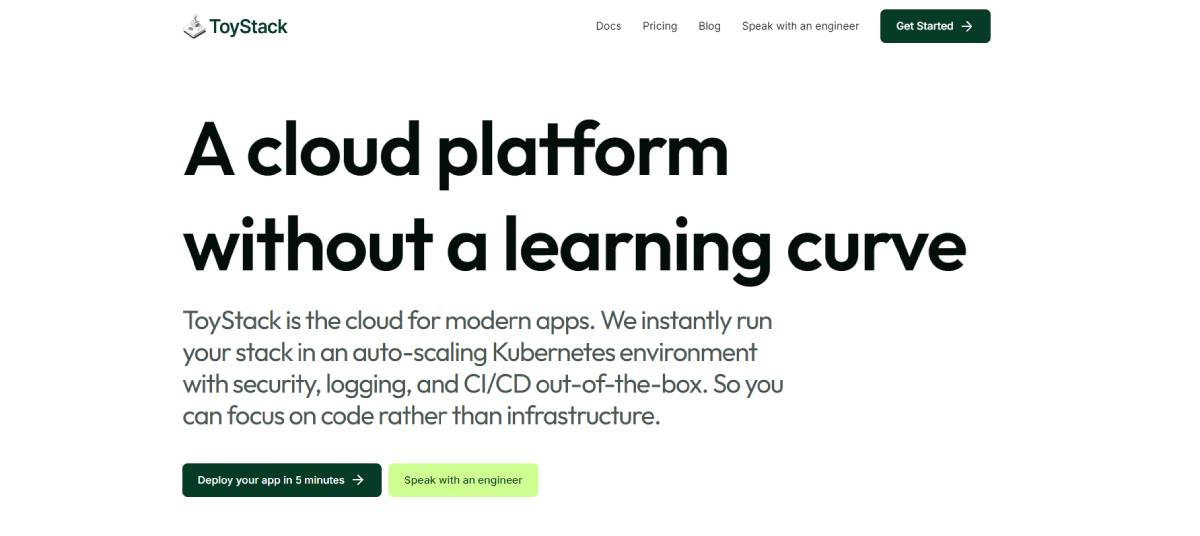
Source: toystack.ai
ToyStack isn't just another player in the cloud space; it's redefining what a cloud platform can be. Born from the frustrations of complex setups and unexpected costs, ToyStack aims to be the platform that makes you wonder why cloud deployment was ever difficult.
Key Features:
One-Click Deployments: Push your code and watch it go live in minutes, not hours.
CI/CD Integration: Seamlessly integrate with your existing workflow.
Multi-Region Scaling: Grow your application globally without the usual headaches.
Kubernetes Orchestration: Harness the power of Kubernetes without needing to understand its complexities.
Beginner-Friendly Pricing: Start for free and scale up affordably as you grow.
ToyStack's Neo-Cloud Platform Services:
Smart Deployments:
Containerized application hosting using Docker
Automatic scaling and self-healing infrastructure
Custom domain support with automatic SSL certificate management
One-click deployment of PostgreSQL and Redis
Automated scaling and management
Real-time performance monitoring
Automated daily backups with point-in-time recovery
Upcoming Features:
Cron Jobs: Schedule and manage recurring tasks effortlessly
Message Queues: Implement robust asynchronous processing
OS Deployments: Spin up entire operating systems on demand
AI-Generated Code Deployment: From concept to live application in record time
Environment Composer:
Stitch together backends, databases, workers, and frontends into cohesive environments
Spin up, destroy, or duplicate environments with a single click
Observability Stack:
Built-in analytics and reporting
Real-time resource stats and logs piped directly to your dashboard
Ephemeral Environments:
Set environments to run for specified durations
Optimize costs by paying only for actual usage time
Open Source Deployment:
Deploy any open-source image from Docker Hub or similar registries
What sets ToyStack apart is its commitment to simplicity without sacrificing power. It's designed for developers who want to focus on coding, not infrastructure management. With ToyStack, you're not just getting a cloud platform; you're getting a partner that grows with your project.
2. DigitalOcean: The Developer's Reliable Friend
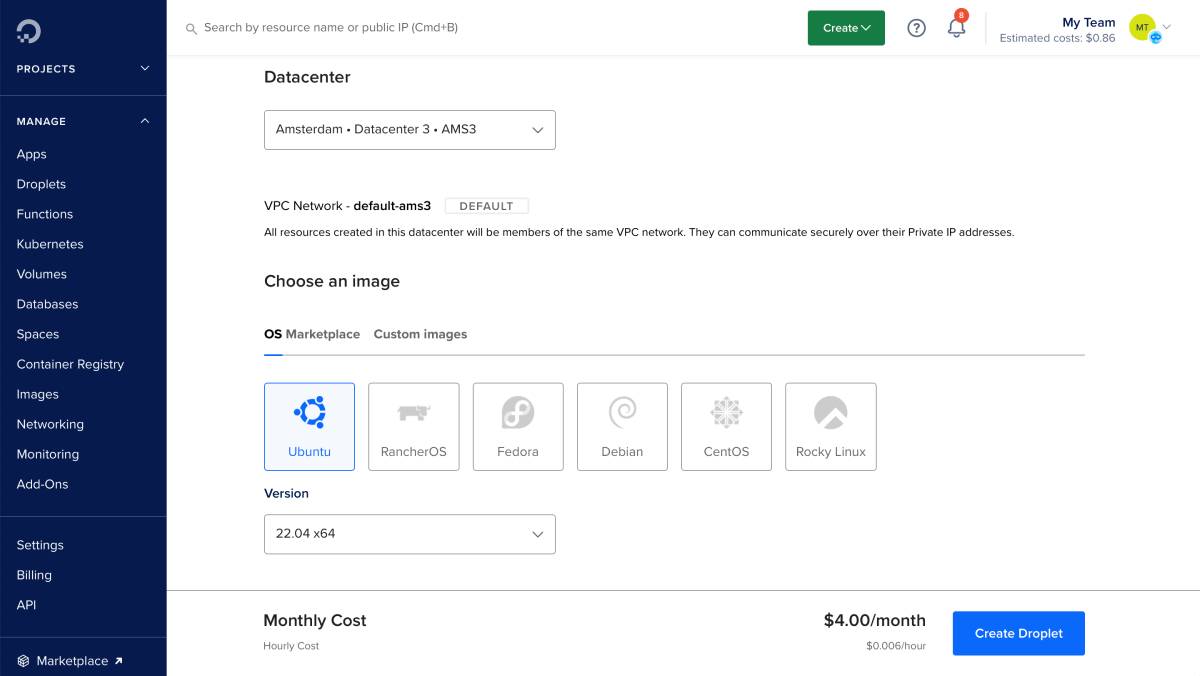
Source: DigitalOcean
DigitalOcean has long been a favorite in the developer community, known for its straightforward approach and developer-friendly features.
Key Features:
Droplets: Virtual private servers that are quick to deploy and easy to manage
App Platform: A Platform-as-a-Service (PaaS) solution for easy app deployment
Managed Databases: Easily set up and scale MySQL, PostgreSQL, and Redis
Spaces: S3-compatible object storage for your project assets
DigitalOcean shines in its simplicity and predictability. Their fixed monthly pricing model means no surprise bills, making it ideal for personal projects with consistent resource needs. The platform offers a clean, intuitive interface that doesn't overwhelm you with options.
For hobbyist developers, DigitalOcean's extensive tutorials and community resources are invaluable. They've created an ecosystem that not only provides cloud services but also helps you learn and grow as a developer.
3. Vercel: The Frontend Developer's Dream
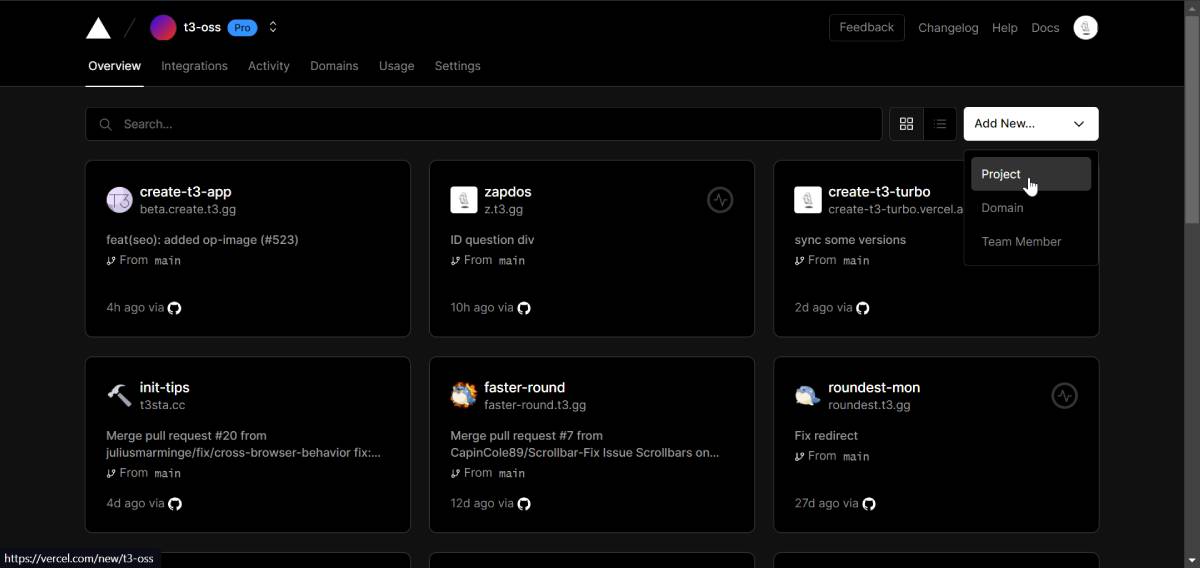
Source: Vercel
Vercel has carved out a unique niche, focusing on making deployment a breeze for frontend and full-stack JavaScript applications.
Key Features:
Edge Network: Global CDN for lightning-fast content delivery
Serverless Functions: Build and deploy API endpoints without managing servers
Preview Deployments: Automatically deploy and preview changes for every Git push
Integration with Popular Frameworks: Seamless deployment for Next.js, React, Vue, and more
Vercel's strength lies in its deep integration with modern web development workflows. It's not just about hosting; it's about providing an end-to-end solution for building, deploying, and scaling web applications.
Their free tier is particularly generous, making it an excellent choice for personal projects, portfolios, and small startups. Vercel's focus on the developer experience means you spend less time configuring and more time creating.
4. AWS Free Tier: The Cloud Giant's Playground

Source: AWS
Amazon Web Services (AWS) offers a vast array of services, and their free tier provides a taste of this power without the enterprise price tag.
Key Features:
EC2: Virtual servers in the cloud
S3: Scalable storage in the cloud
Lambda: Run code without thinking about servers
RDS: Managed relational database service
AWS's free tier is more than just a trial; it's a comprehensive introduction to cloud computing. For personal projects, it offers enough resources to run small applications indefinitely. Services like S3 for storage and EC2 for compute power are particularly useful for a wide range of projects.
The learning curve can be steep, but the skills you gain are highly valuable in the job market. AWS also provides extensive documentation and a large community, making it easier to find solutions to any issues you encounter.
5. Kamatera: The Customization Champion
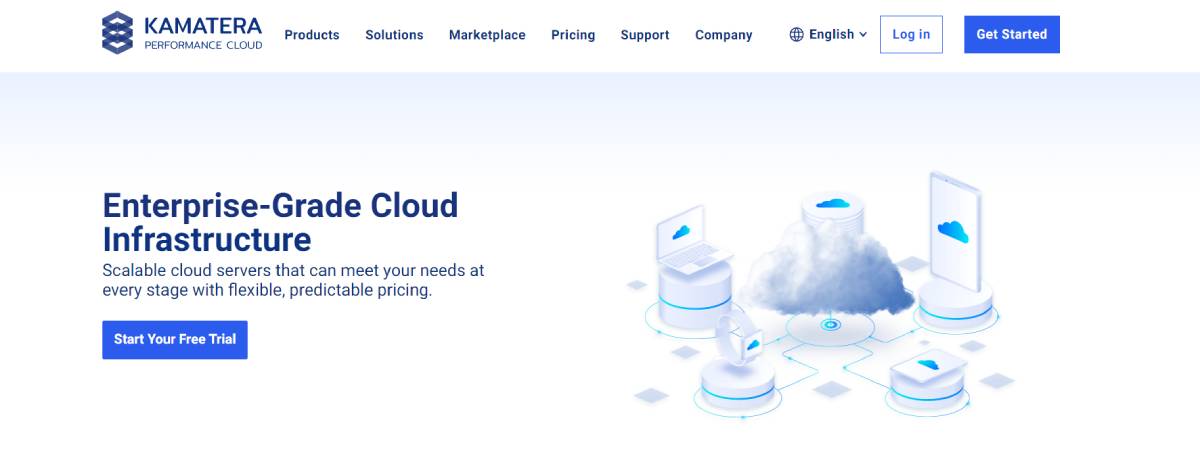
Source: Kamatera
Kamatera stands out with its focus on providing highly customizable cloud instances, perfect for developers who need specific configurations.
Key Features:
Custom Cloud Servers: Tailor your server's CPU, RAM, and storage to your exact needs
Global Data Center Network: Choose from multiple locations worldwide
Flexible Scaling: Easily adjust resources up or down as your project grows
Managed Cloud Services: Optional expert support for those who need it
Kamatera's 30-day free trial is one of the most generous in the industry, allowing you to thoroughly test their services. Their approach is ideal for projects that don't fit the one-size-fits-all model of some cloud providers.
Whether you need a specific OS version, a particular software stack, or unique hardware configurations, Kamatera gives you the control to set up your environment exactly as you need it.
Each of these platforms offers unique strengths, catering to different needs and skill levels. From ToyStack's all-in-one neo-cloud approach to Kamatera's customization options, there's a platform suited for every type of personal project. The key is to align your choice with your project's specific requirements, your technical skills, and your growth ambitions.
How to Match Cloud Features to Your Project Needs
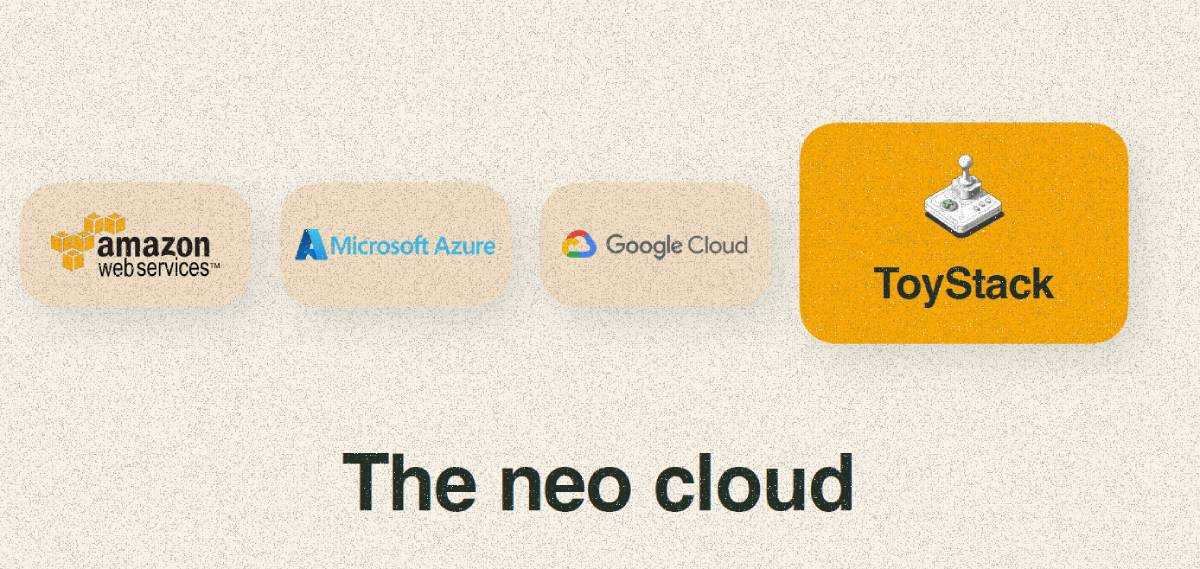
Source Toystack.ai
Choosing the right cloud platform isn't just about picking the one with the most features or the lowest price. It's about finding the right fit for your specific project. Let's break it down:
For Simple Websites
If you're building a portfolio site or a simple blog, platforms like Vercel or ToyStack are your friends. They offer quick deployments and handle scaling automatically, so you can focus on your content.
For Hobby Apps
Building the next big thing in your spare time? Look at ToyStack or DigitalOcean. They offer the flexibility to experiment without breaking the bank.
For Data Crunching
If your project involves processing large amounts of data, AWS might be your best bet. Their range of specialized services can handle everything from simple scripts to complex machine learning models.
For Learning and Experimentation
Want to get your hands dirty with cloud tech? AWS Free Tier or Kamatera's trial period give you room to explore without commitment.
Remember, the best platform is the one that lets you spend more time coding and less time managing infrastructure.
FAQs About Cloud Platforms for Personal Projects
Q: How do I avoid unexpected costs?
A: Start with platforms offering clear, predictable pricing. Use built-in monitoring tools, set up billing alerts, and regularly review your usage.
Q: What's the easiest platform to start with?
A: For absolute beginners, ToyStack and Vercel offer the smoothest onboarding experience. Their one-click deployments and intuitive interfaces flatten the learning curve considerably.
Q: Which platforms have the best free tier offerings?
A: AWS Free Tier is hard to beat for sheer variety. However, Vercel and ToyStack offer generous free tiers that are more than sufficient for many personal projects.
Q: Can I move my project between platforms easily?
A: It depends on your project's architecture. Containerized applications are generally easier to move. Platforms like ToyStack that use standard technologies (like Kubernetes) can make migrations smoother.
Q: Do I need to learn DevOps to use these platforms?
A: Not necessarily. Platforms like ToyStack and Vercel abstract away much of the DevOps complexity. However, basic understanding of cloud concepts can help you make the most of any platform.
Q: Are these platforms secure for personal data?
A: All the platforms mentioned prioritize security. However, always follow best practices like using strong passwords, enabling two-factor authentication, and keeping your application code secure.
Conclusion
Cloud platforms have democratized app deployment and scalable computing. Whether you're a student working on a class project, a developer with a side hustle, or a hobbyist with a big idea, there's a cloud platform out there that fits your needs and your budget.
From ToyStack's developer-friendly approach to AWS's vast service catalog, each platform we've covered offers unique strengths. The key is to align your choice with your project's needs, your technical skills, and your growth ambitions.
Ready to take your personal project to the cloud? Why not start with ToyStack? With its intuitive interface, powerful features, and beginner-friendly pricing, it's designed to get your ideas off the ground fast. Sign up for a free trial and see for yourself how easy cloud deployment can be.
Remember, the best cloud platform is the one that lets you focus on building, not infrastructure wrangling. So pick a platform, start deploying, and who knows? Your personal project today could be the next big thing tomorrow.
